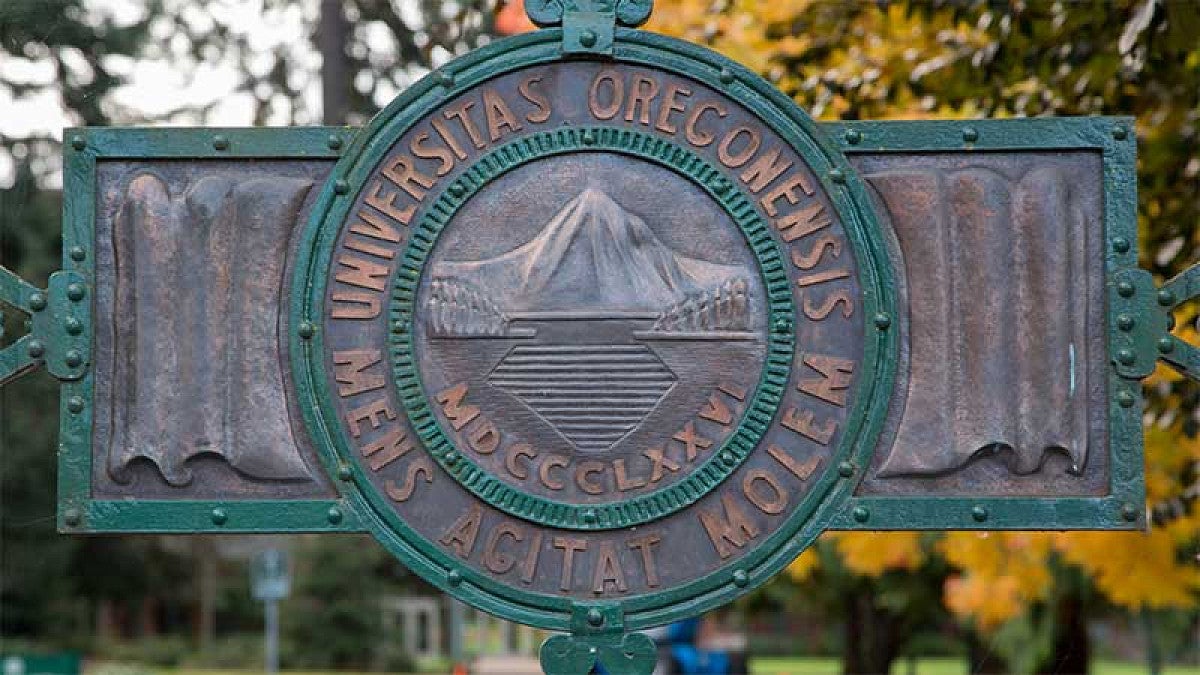The Board of Trustees of the University of Oregon learned about projected budget challenges, the UO’s most diverse freshman class ever and an increase in scholarship programs in its recently concluded fall meeting.
Board members also approved an income-generating licensing agreement among other issues that came before them over a two-day meeting in the Ford Alumni Center.
Jamie Moffitt, vice president for finance and administration, noted that the university is facing some financial headwinds that could drive a budget gap of $5.6 million. Moffitt largely attributed the potential gap to an ongoing increase in expenses related to PERS, the Public Employees Retirement System, and other fixed labor costs, coupled with a drop in international enrollment and other student trends.
“Our budget is tight, precariously tight,” President Michael Schill told trustees.
The board also learned more about Gov. Kate Brown’s recommended budget for the 2019-21 biennium, which was released Nov. 28, and its possible effects on higher education funding statewide.
The budget includes two options, the first of which is a flat biennial base budget that allocates funds based on current revenue projections. Under this option, the UO would likely be forced to consider double-digit tuition increases for resident undergraduates and potential cuts to services, programs and its workforce in order to balance its budget.
The second version is an investment budget that assumes the passage of cost containment and revenue reform in the next legislative session. That budget increases the Public University Support Fund by $120 million.
That level of funding would keep this year’s tuition increase for resident undergraduate students at the UO at or below 5 percent. It would also preserve most recent investments in financial aid and student support programs.
“There are a lot of things we still don’t know,” Libby Batlan, associate vice president of state and community affairs, told the board.
During a preparatory discussion on tuition-setting, Moffitt and Kevin Marbury, vice president for student life, laid out the challenges the state budget uncertainty presents the Tuition and Fee Advisory Board.
The board is planning on setting nonresident undergraduate and graduate tuition in early March and then holding off setting resident undergraduate tuition until late May once more is known about the state budget and university enrollment projections.
During the Academic and Student Affairs Committee meeting on Monday, Jim Brooks, associate vice president and director of financial aid and scholarships, noted that as tuition has increased, the university has upped its financial assistance to students as well.
Funding for need and merit-based scholarships increased from $21.6 million in 2013-14 to $33.8 million in 2017-18, a gain of 56 percent. PathwayOregon, which covers all tuition and fees for eligible Oregonians, also welcomed its largest class ever this fall, with just above 800 students.
In other business, the board approved an expansion of Matthew Knight Arena to add some additional office space and upgrades to graphics and technology. The project, which is scheduled to start this month, would be funded entirely through private philanthropy. Once complete, the improvements would be given to the university in the form of a capital gift.
The expansion includes 15,000 square feet of office space to house the men’s and women’s basketball and volleyball teams, which are now located in the Casanova Center adjacent to Autzen Stadium. The expansion will be located between the Matthew Knight Arena practice courts and Villard Street.
The board also voted unanimously to accept a gift of 9 acres of beach and dune property on the southern Oregon coast in Bandon. The site is about 30 minutes from the Oregon Institute of Marine Biology and would be used as an outdoor classroom for courses in biology, anthropology, earth science and environmental science as well as for field research.
Trustees also unanimously approved a new, 10-year licensing agreement with Fanatics Apparel. Fanatics is an online retailer that would help protect the university’s brand and market UO-branded goods. The agreement includes guaranteed minimum royalties of $21.5 million over the next decade.
Vice President for Communications Kyle Henley noted that the agreement is a hedge against volatility while good opportunities for the university remain. In addition, 40 local companies with existing licenses will maintain those rights for three years.
“There will still be ample opportunities for local folks to be involved,” Henley added.
The agreement excludes Nike and Columbia Sportswear goods and apparel.
Jessie Minton, vice provost and chief information officer, gave a presentation on SecureU, the university’s efforts in cybersecurity, the need for which was heightened after a phishing attack last summer that netted hackers the passwords to 653 accounts. One step includes moving toward two-step authentication for university users to access their accounts.
Also, Roger Thompson, vice president for student services and enrollment management, told the board’s Academic and Student Affairs Committee that this fall’s entering class was the second-largest ever, had the highest percentage of minority students at 36 percent, and had more first-generation college students than he’d ever seen.
Thompson also reported that his office has so far received 12,576 applications through Nov. 15, 24 percent more than last year to date, and 65 percent above 2015 levels.
“It’s very good news, but it’s also very early,” Thompson said.
During his remarks, Schill updated the board on the plan to examine the current structure of the College of Arts and Sciences in order to promote more interdisciplinary efforts across campus. He also shared the latest on a data science initiative, including the appointment of biology professor Bill Cresko as founding director.
The board’s next set of regular meetings is scheduled to take place March 4-5, 2019.


